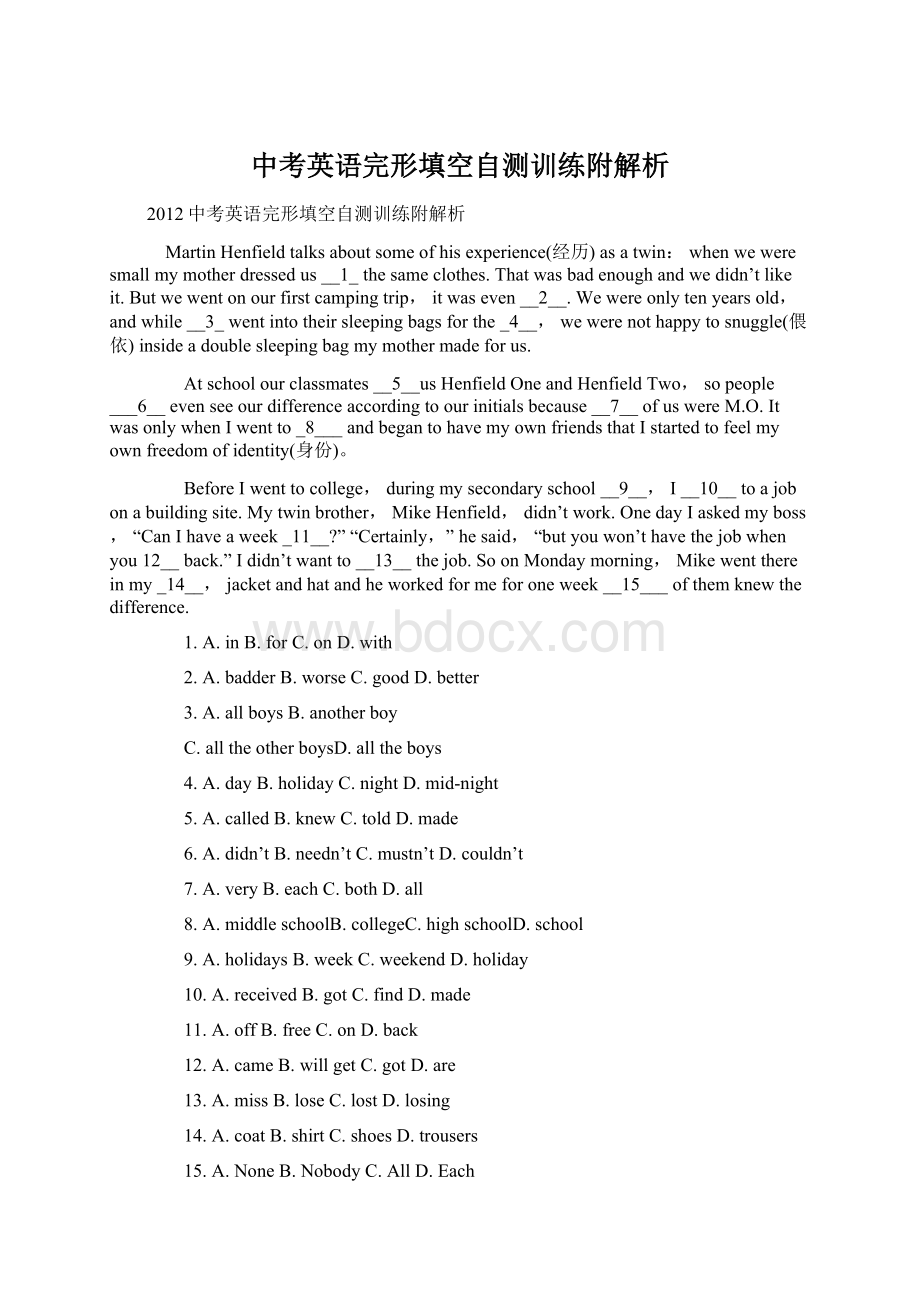中考英语完形填空自测训练附解析Word文档格式.docx
《中考英语完形填空自测训练附解析Word文档格式.docx》由会员分享,可在线阅读,更多相关《中考英语完形填空自测训练附解析Word文档格式.docx(8页珍藏版)》请在冰豆网上搜索。

学而思名师点评
这是一则关于双胞胎的故事,说明了作为双胞胎既有他们苦恼的一面,也有乐趣的一面。
在做这则完型填空时,只要抓住双胞胎非常相像这一特点,就很容易理解其中发生的事情了。
答案解析
1.A。
“给某人穿(衣服)”应为dresssb.in。
2.B根据下文可知野营中的情况比平时更糟糕。
。
3.C。
theother加名词复数表示“剩余的所有的人”。
4.C。
睡袋应用于夜间。
5.A。
“称呼某人……”用callsb.…。
6.D。
7.C。
根据后面的系动词were,应用both表复数。
8.B。
根据上下文可知,直到大学,这种情况才有所改变。
9.D。
指中学生涯的最后一个假期。
10.B。
“找到一份工作”可用get/findajob,但此处应用过去时。
11.A。
haveaweekoff休息一个星期。
12.D。
只有D项时态正确。
13.B。
14.D。
15.A。
没有一个人看出这时双胞胎交换了一下。
B项不可带of。
Haveyoueverseentheadvertisement:
Learnaforeignlanguageinsixweeks,1giveyourmoneyback?
Ofcourse,it2happensquitelikethat.Theonlylanguage3tolearnisthemotherlanguage.Andthink4practiceisneededforthat.BeforetheSecondWorldWarpeopleusuallylearnedaforeignlanguage5theliterature(文学)ofthecountry.Nowmostpeoplewantto6aforeignlanguage.Everyyearmillionsofpeoplestartlearning7。
Howdotheydoit?
Somepeopletryathome8booksandtapes,othersgotoeveningclassesorwatchTVprograms.9theyusethelanguageonly2or3timesaweek,learningitwill10alongtime,likelanguagelearningatschool.Afewpeopletrytolearnalanguagefastbystudyingfor6or11hoursaday.It‘smucheasiertolearnthelanguageinthecountrywhereit12。
Butmostpeopleare13todothis,andmanypeopledon’thavetodoso.Machinesandgoodbookswillbevery14,buttheycannotdothestudents‘work.15thelanguageislearnedquicklyorslowly,itishardwork.
1.A.soB.orC.andD.but
2.A.can'
tB.impossibleC.neverD.often
3.A.easilyB.difficultC.ableD.easy
4.A.howmuchB.howlongC.howfastD.howmany
5.A.studiedB.tostudyC.studyingD.study
6.A.talkB.tellC.speakD.say
7.A.themB.thisC.thatD.it
8.A.withoutB.withC.inD.by
9.A.IfB.WhenC.SinceD.Until
10.A.spendB.useC.takeD.cost
11.A.someB.moreC.otherD.less
12.A.speaksB.isspeakingC.spokeD.isspoken
13.A.ableB.possibleC.unableD.notpossible
14.A.carefulB.forgetfulC.wonderfulD.helpful
15.A.eitherB.whetherC.whatD.how
本文主要想告诉读者,学英语是一个长期而艰苦的劳动,没有任何捷径可走。
无论你用什么方法学习--用书、机器或在学校,不多实践就无法达到预期的目的。
答案简析
B。
这里的or是“否则”的意思。
C。
根据作者的观点,这种事绝对不可能发生。
impossible是一个形容词,不符语法,can’t后不可能跟happens,often意思与作者的意图相反。
D。
唯一容易学的语言是母语。
这里需要一个形容词充当后置定语。
A。
用来修饰不可数名词,只有用howmuch,全句意为“母语好学,还需要那么多的练习。
”何况外语呢?
动词不定式充当目的状语。
意为“学习外语来研究文学”。
说某种语言用speak,speakEnglish,speakChinese。
用it代指上文所说的aforeignlanguage。
这里的with是“用”的意思。
作者在这里提出一种假设。
如果他们一星期只有一两次使用外语。
固定短语,意为“做某事花费某人多长时间”。
后面省略了than6hours。
意为6个小时或更多的时间。
it代指上文所指的foreignlanguage,故用被动被态。
许多人不可能做到这一点。
这里不可以用notpossible,因为它的主语不可以用人。
机器和书对于学习英语来说是很有帮助的。
15.B。
whether…or…固定短语。
Ihavetriedmanywaystobe1。
Idon’twearasweaterwhenI2,andtwodaysagoIwalkedinthe3withoutmyshoes.Butsofarnothing4。
Debbieoncetoldmeaboutaboyinherclasswholiked5school.Hewouldrub(摩擦)theendofthethermometer(温度计)untilitwent6to39℃。
Thenhe’dputitinhismouthandhismotherwouldthinkhewas7ill.
ThismorningItrieddoingthatbutit8wentabove35℃andIrubbeditforten9。
SoIheldthethermometer10thelightonmydeskanditwentupto40℃。
IthoughtI’dputitinmymouthandwalkdownstairslikethat.11mymotherwouldtakeitoutandshewouldbe12whenshesawthatIwasratherill.
TheonlytroublewasIdidn’tknowthethermometerwouldbeso13,AssoonasIputitintomymouthIburntmytongue(舌头)!
Ispit(吐)thethermometerout.Itfell14thefloorbutit15。
1.A。
wellB.fineC.illD.bad
2.A。
couldB.shouldC.mustD.might
3.A。
waterB.rainC.sunD.wind
4.A。
happensB.happenedC.willhappenD.hashappened
5.A。
beingawayfromB.leaving
C.stayingatD.beingoutof
6.A。
onB.downC.upD.off
7.A。
reallyB.realC.badD.badly
8.A。
can’tB.notC.neverD.didn’t
9.A。
secondsB.hoursC.minutesD.moments
10.A。
nearB.neartoC.nextD.nextto
11.A。
WhenB.ThenC.SoD.If
12.A。
worriedB.surprisedC.happyD.frightened
13.A。
coldB.hotC.warmD.cool
14.A。
offB.downC.toD.on
15.A。
didn’tbreakB.didn’tbrokeC.wasn’tbrokenD.wasbroken
这是一篇小幽默。
一个男孩为了装病,用尽了各种办法想告诉妈妈自己的体温很高,结果差点儿烫伤了自己。
1.C。
根据下文得知,这个小孩就是想让自己生病。
2.B。
这里应选择情态动词should,表示在该穿毛衣的时候他不穿,其实他就是想让自己冻出病来。
3.B。
跟上两题同解。
4.D。
sofar常与动词的现在完成时连用,表示“到目前为止”。
5.A。
leaveschool表示“辍学、毕业离校”的动作,beawayfromschool则表示“不上学、逃学”的状态。
6.C。
up表示“温度上升”。
7.A。
妈妈会认为他真的病了,故选副词really。
8.C。
其他选项在语法上均错。
9.C。
根据文意。
10.D。
nextto表示“临近、非常接近”。
11.B。
Then是副词,表时间上的“顺承”。
其他三选项均引导从句,故不选。
12.A。
妈妈得知孩子生病,首先感到担心。
13.B。
这里表示“烫”,所以不能选warm。
14.D。
fallon为“掉到……上”,falloff是指“从某处摔下”,falldown是“落下”。
15.C。
break为及物动词,与主语构成动宾关系,所以用被动语态形式wasbroken。
DoyouknowEskimos(爱斯基摩人)?
Letmetellyousomethingabouttheir1。
TheEskimosliveneartheNorthPole(北极)。
Thereareonlytwo2there,winterandsummer,Therearenospring3autumnthere.Thewinternightsare4。
Youcan‘t5thesunformorethantwomonths,evenatnoon.Thesummerdaysarelong.Formorethantwomonths,thesunnever6andthereisnonight.
TheEskimoshave7clothes.Theymaketheirclothesfromtheskinofanimals.Fromtheseskinstheymakecoats,capsand8。
NeartheNorthPoletreescan’tgrow,foritistoo9there.TheEskimos10maketheirhousesfromskins,snoworstones(石头)。
Whenthey11instormandcan‘t12home,theymakehouseofsnow.They13thesesnowhouseswhenthestormis14。
Lifeis15fortheEskimos,buttheystillliketolivethere.
1.A.workB.lifeC.holidayD.families
2.A.weatherB.seasonsC.monthsD.years
3.A.notB.orC.andD.as
4.A.shortB.warmC.longD.cold
5.A.seeB.watchC.lookD.lookat
6.A.risesB.goesupC.dropsD.goesdown
7.A.beautifulB.metalC.warmD.cool
8.A.goodsB.drinksC.medicineD.shoes
9.A.coldB.hotC.dryD.wet
10.A.willB.shouldC.neverD.haveto
11.A.gooutB.gooverC.keeponD.geton
12.A.getbackB.gotoffC.getonD.getin
13.A.makeB.leaveC.stayD.break
14.A.overB.comingC.goingD.hard
15.A.easyB.interestingC.hardD.lucky
本文介绍了爱斯基摩人的生活情况:
爱斯基摩人的特殊生活习惯缘于那儿的特殊气候。
1.B。
根据下文得知这里介绍的是爱斯基摩人的生活(life)。
2.B。
根据winter和summer判断。
3.B。
no.。
..or.。
..表示对两者否定。
由后一句话可推断答案。
冬夜很长,几乎看不到太阳,也就是没有白天,这正是北极的气候特征。
see表示“看”的结果,watch和look都表示“看”的动作。
夏天白昼长,几乎没有夜晚,太阳从不下山,所以选godown。
他们要穿上暖和的衣服才能抵御严寒。
8.D。
这里是指用动物皮来做衣服鞋帽。
9.A。
北极很冷。
10.D。
表示客观原因使他们不得不用特殊的材料来建房。
表示在外面遇到风暴时。
12.A。
由于风暴而回不了家。
用雪造房是因为遇到风暴回不了家,风暴过后自然要离开雪房子了。
14.A。
beover表示结束。
15.C。
这种恶劣的气候条件下,生活是很艰难困苦的,故选hard。
Manypeoplegotoschoolforaneducation.1learnlanguages,history,geography,physics,chemistryandmaths.Othersgotoschooltolearnaskillsothattheycan2aliving.School3isveryimportantanduseful.Yetnoonecanlearneverythingfromschool.Ateacher,nomatterhowmuchhe4,cannotteachhisstudentseverythingthey5toknow.Theteacher‘sjobistoshowhisstudentshowtoreadandhowto6。
Somuchmoreistobelearned7schoolbythestudentsthemselves.
Itisalwaysmoreimportanttoknowhowtostudyby8thantomemorize(熟记)somefactsorformula(公式)。
Itis9quiteeasytolearna10factinhistoryoraformulainmathematics.Butitisverydifficulttouseaformulain11outamathsproblem.Greatscientists,suchasEinstein,NewtonandGalileo,didn’tlearnmanythingsfromschool.Buttheywereallso12thattheyinventedsomanythingsformankind.
The13fortheirsuccessisthattheyknewhowtostudy.Theyreadbooksthatwerenot14atschool.Theyworkedhardalltheirlives,wastingnotasinglemoment.Theywouldaskmanyquestionsastheyreadandtheydidthousandsof15。
1.A.StudentsB.TheyC.WeD.Pe